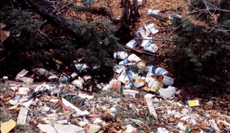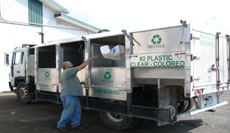DACF Home → Bureaus & Programs → Bureau of Agriculture → Division of Animal and Plant Health → Board of Pesticides Control → Applicator Resources → Pesticide Container Recycling
Pesticide Container Recycling

Before: Pesticide containers dumped in the woods.
Where to Recycle Pesticide Containers in Maine
- Dexter—Mid-Maine Solid Waste Association; Tramp King, Superintendent, 207-924-3650; trampas.king@gmail.com
- Frenchville—Valley Recycling Facility; Chuck Pelletier, Facility Operator, 207-543-6372; chuckp@pioneerwireless.net
Be sure to call for details on preparing the containers and to arrange a delivery time.

After: The proper and safe recyling of pesticide containers.
A program to manage the proper disposal of pesticide containers was instituted in Maine in 1983, when a deposit law was enacted for restricted-use pesticide containers. Over the years, Board inspectors ensured that the most hazardous pesticide containers were returned, thoroughly cleaned, and properly disposed of in a licensed solid waste facility. However, the law does not include general-use pesticide containers, which, without any controls, end up burned on-site, or in public landfills and incinerators.
In 1991, in an effort to keep plastic pesticide containers completely out of the waste stream, the Board began working with pesticide dealers, the non-profit Ag Container Recycling Council (ACRC), and local municipalities, to develop a program where, on a strictly volunteer basis, both restricted- and general-use plastic pesticide containers could be recycled. With oversight and coordination from the Board, plastic containers, collected throughout the growing season, are taken to a transfer station, baled, and then sold and recycled to create new non-consumer products, where chemical purity is not a priority, such as drainage tiles, railroad ties, pallets, fence posts, and speed bumps.
At present, there are recycling facilities in Dexter, in central Maine, and in Frenchville, in northern Maine, and the Board is currently working with ACRC and the Maine Resource Recovery Association to develop infrastructure to provide container recycling in the eastern and southern regions of the state.
Through this program, Maine has recycled an average of 35,000 pounds of #2 plastic annually since 2001. Nationally, since the program started in 1992, approximately 110 million pounds have been recycled.